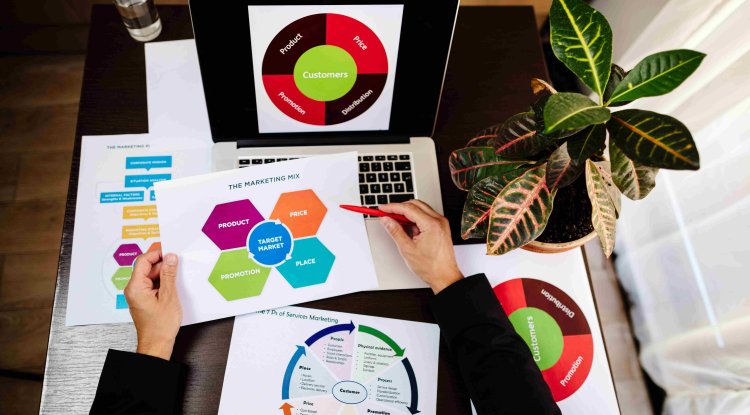The Future of Predictive Scoring: Trends and Innovations in Marketing Automation
Discover the latest trends and innovations in predictive scoring within marketing automation. Learn how businesses leverage data to drive success and enhance customer engagement.

Predictive scoring is not just a buzzword in marketing automation; it's the next frontier for data-driven strategies. As businesses increasingly rely on technology to optimize their marketing efforts, the ability to predict customer behavior, preferences, and potential revenue has become a game-changer. In this article, we will explore the emerging trends and innovations shaping the future of predictive scoring and its impact on marketing automation.
The Evolution of Predictive Scoring
Predictive scoring has come a long way since its inception. Initially, it relied heavily on basic demographic data and historical sales trends. However, as technology evolved, so did the sophistication of predictive models. Today, we have access to vast amounts of data—both structured and unstructured—that can be harnessed to create highly accurate predictive scores.
Machine learning algorithms are at the forefront of this evolution. They analyze patterns in data, providing marketers with insights that were previously unattainable. For instance, a leading e-commerce company recently employed machine learning algorithms to analyze customer interactions across multiple channels, resulting in a 30% increase in conversion rates. This case study exemplifies the tangible benefits of leveraging predictive scoring in marketing strategies.
Key Trends in Predictive Scoring
1. Integration with AI and Machine Learning
The integration of AI and machine learning is transforming predictive scoring from a static process to a dynamic one. These technologies allow for real-time data analysis, enabling marketers to adjust their strategies on the fly. For instance, predictive models can now continuously learn from new data, refining their accuracy and providing more relevant insights. This shift toward automation means that marketers can focus on strategy while leaving data analysis to machines.
2. Enhanced Customer Segmentation
Predictive scoring is not just about identifying leads; it's also about understanding them. Advanced segmentation techniques powered by predictive analytics enable marketers to tailor their messages to specific customer groups. By understanding the unique needs and behaviors of each segment, companies can create personalized campaigns that resonate with their audience. For example, a B2B company utilized predictive scoring to segment its leads based on their likelihood to convert, resulting in a 50% increase in lead quality and engagement.
3. Real-Time Analytics
The demand for real-time insights is at an all-time high. Businesses are no longer satisfied with historical data; they want to know how their customers are behaving right now. Predictive scoring tools are increasingly being designed with real-time analytics capabilities, allowing marketers to react swiftly to changing customer behavior. This immediacy can lead to timely interventions, enhancing customer experience and driving conversions.
4. Predictive Scoring for Customer Retention
While attracting new customers is crucial, retaining existing ones is equally important. Predictive scoring is being utilized to identify at-risk customers, enabling businesses to implement retention strategies before it's too late. By analyzing customer engagement metrics and purchase history, marketers can create targeted campaigns aimed at re-engaging lapsed customers. This proactive approach not only increases customer loyalty but also maximizes lifetime value.
5. Ethical Data Use and Transparency
As data privacy concerns continue to rise, the ethical use of customer data in predictive scoring will be a significant trend. Marketers must be transparent about how they collect and use data, ensuring compliance with regulations like GDPR. Emphasizing ethical data practices will not only build trust with customers but also enhance brand reputation.
Innovations Shaping the Future
Advanced Predictive Algorithms
The future of predictive scoring lies in developing advanced algorithms that can account for a wider range of variables. For example, neural networks, which mimic the human brain's functioning, are gaining traction in predictive analytics. These algorithms can identify complex patterns in data, providing deeper insights into customer behavior.
Natural Language Processing (NLP)
NLP is revolutionizing how we interpret customer sentiments. By analyzing customer interactions across social media, reviews, and surveys, businesses can gain valuable insights into customer perceptions. This information can then be integrated into predictive scoring models to refine customer targeting and messaging.
Integrating Predictive Scoring Across Channels
As customers interact with brands across multiple touchpoints, integrating predictive scoring across channels is crucial. A unified approach ensures that marketing efforts are consistent and relevant, leading to a seamless customer experience. This integration can also help marketers understand the customer journey better, identifying the most effective touchpoints for engagement.
Conclusion
Predictive scoring is no longer just a luxury; it’s a necessity for businesses looking to thrive in the digital age. As trends and innovations continue to shape this field, marketers must stay informed and agile to harness the power of predictive analytics effectively. The case study of the e-commerce company demonstrates that leveraging predictive scoring can lead to significant improvements in conversion rates and customer engagement.
As you embark on your journey to master predictive scoring in marketing automation, remember that the right tools and insights can transform your marketing strategies. Join me in exploring these exciting possibilities, and let’s unlock the full potential of predictive scoring together.
About Me
I am Raghav Chugh, a seasoned digital marketing and technology professional with a passion for leveraging data to drive business success. With three Marketo Certified Expert (MCE) certifications and extensive experience in lead lifecycle design, marketing activities, and database management, I am well-equipped to guide you on your journey to mastering Marketo's Revenue Cycle Analytics. Connect with me on LinkedIn for more insights into the world of digital marketing and technology.
At SMRTMR.com (Strategic Marketing Reach Through Marketing Robotics), we are dedicated to providing valuable information and resources to readers across the globe. Our articles, like this one, aim to empower individuals and businesses with the knowledge they need to succeed in the ever-evolving digital landscape.
Raghav Chugh, the founder of SMRTMR.com, brings his expertise in digital marketing and technology to each article. With a commitment to delivering high-quality, actionable content, SMRTMR.com has become a trusted source for professionals seeking to stay ahead in the world of digital marketing.
What's Your Reaction?


















